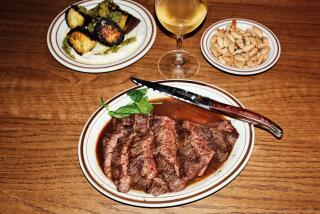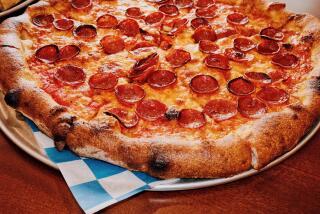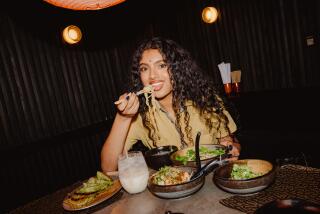Temple of Dining
We are driving down San Fernando Road looking for the great Thai Temple, with a direction lost somewhere in my childhood memory. My logic for exploring L.A. without a map is that somehow traveling becomes more interesting when you are lost, simply because of the unexpected things you find along the way.
An hour later we stop at the San Fernando Mission to ask for directions to the Thai Temple. Itâs the middle of Sunday Mass, and the girls behind the gift store counter donât know where it is, so we look in their phone book, but to no avail. Finally my friend and I give up and call information. The man on the other end of the line says, âA Thai temple? The one with the underground food court, and you use tokens to buy food?â
âYes, thatâs the one,â I say.
âI used to go there every weekend with my girlfriend,â he says.
âSo you know how to get there?â
âNo.â
âLet me guess, you two broke up and you never went back there since.â
âThatâs how the story goes.â
He gives us a number to the Thai temple of L.A., which is in North Hollywood. We call that number and ask if it is indeed the temple with great Thai food.
âYes, yes,â a woman answers, the way parents respond to a childâs exclamation that Christmas is all about opening presents.
We get back on the freeway, take the 118 east, the 5 south, then the 170 and exit at Roscoe Boulevard. Twenty minutes later we are walking up the steps of a grand building whose architecture transports us to another time and place. The red roof with golden trim exudes a sense of sacredness and awe as Buddhist icons and statues reach up to the ceiling.
Inside the temple, the sound of synchronized chanting echoes through the walls as the smell of burning incense lingers, disconnecting my mind from geographic reality. For a moment I am 7 years old again, helping my mom light the incense sticks at our local stupa in Ben Tre, a province of the Mekong Delta in Vietnam, praying for a better harvest season. The next moment, I am in a temple in Singapore, listening to the strange chanting of Buddhist scripture.
I donât understand the Thai language, yet somehow the rhythmic flow at the Wat Thai is familiarly comforting and relaxing. The Theravada monks in brilliant orange robes, the color of turmeric, sit motionless along with others in their peaceful worship.
We come upon a little booth where we exchange dollar bills for plastic tokens with the name Wat Thai of Los Angeles written on them. (Wat means Buddhist temple.) We follow a group of people down the stairway for food, with handfuls of red, green and yellow tokens.
I wait in line on the left side by the entrance where a woman mixes fresh batches of papaya salad. My friend returns carrying perfectly grilled chicken and beef satay sticks and some heavenly-smelling curry rice. I fight the temptation to eat his food while waiting for my salad. Finally it is my turn. I am in front of the line.
âOne papaya salad, medium spicy, please,â I say, a little too eagerly.
The woman smiles, takes a giant spoon and scoops strips of green papaya into a large stone mortar. Watching her work is mesmerizing. She pounds the vegetables while adding more ingredients, a heap of roasted peanuts, a spoon of dry shrimp, a sprinkle of crushed red peppers, a few marinated salty crab legs, a little sugar here and a dash of lime juice there.
My mother first took me here about 15 years ago. But I remember this papaya salad as if I had eaten it yesterday. I shout to her over the noise she makes preparing the salad that her papaya salad is the best around. She laughs and says with traditional modesty, âThis salad you can get at any Thai restaurant.â
I shake my head, shouting back, âI have searched for this place for so long. This is the most authentic Thai food around L.A.â
She smiles and continues to mix my salad. My friend and I carry our delicious treasures up the stairs to the benches in the courtyard. We also purchase some crispy fried plantains and taros along with a crepe dessert filled with sweet rice and fresh durian. My friend thinks durian has an odor, and I think it has a sweet fragrance. We agree that it is an acquired taste. At the table, shaded by a giant bo tree (Ficus religiosa), we join a group of people of various ethnicities.
I take out my chopsticks and taste my salad. It is a divine combination of sweet, sour, salty and spicy. I wonder whether anyone has ever reached enlightenment through food. But before I can think of an answer, my mouth becomes inflamed from the chile. I gulp down a whole bottle of water, breathe and announce ecstatically that this salad is the tastiest papaya salad outside of Thailand, being perfectly too hot for human consumption.
I dive in for another round of spicy papaya salad because I have yet to master moderation or sanity. Of course, one could always order the less dramatic âno pepperâ version and still get a delicious salad without the tears.
Another popular item is the food courtâs steaming rice noodle soup, similar to the Vietnamese pho but with a bolder grilled onion taste. Pad Thai, a stir-fried noodle dish with roasted peanuts and chicken, is another popular item, along with Thai ice tea, a drink now served with tapioca pearls if you request them.
The atmosphere of the food court underground is a little cramped and busy, but you can take your food upstairs to eat and enjoy the open air. The other customers are friendly, while at the same time leaving you alone enough to soak up the ambience. I recommend visiting the temple and food court early on weekend mornings when the weather is cooler and the place less crowded.
After we eat, we enter the temple, leaving our shoes outside. One monk reads from a doctrine and periodically people respond with a phrase or two in Thai. I whisper a question to another monk nearby and he summarizes: âBuddhist teaching is that we have both good and bad inside us. We must learn from othersâ examples both virtues and vices ... this way, everyone is your teacher.â
Historically, Thai temples have served social, economic and even political functions within the community by providing a safe gathering ground. Today, Thai temples include community outreach efforts. At the Wat Thai, there are classes for children in classical Thai dance, music, culture and language. Adults can participate in secular courses such as Thai fruit and vegetable carving classes and Thai language classes. Of course there are also Buddhism classes and meditation practice for those who seek a spiritual path.
âHappiness comes from understanding, respect, and friendshipâ, says monk Phrakru Sumondharmavong, a resident monk at the Wat Thai. âWe are equal even with difference in belief, we can be friends and live in peace and harmony.â
*
The food court is open Saturday and Sunday, from 9 a.m. to 5 p.m.. The Wat Thai of Los Angeles is at 8225 Coldwater Canyon Ave., North Hollywood, (818) 780-4200. For more information, visit its Web site: www.watthaila.org.
More to Read
Sign up for The Wild
Weâll help you find the best places to hike, bike and run, as well as the perfect silent spots for meditation and yoga.
You may occasionally receive promotional content from the Los Angeles Times.






